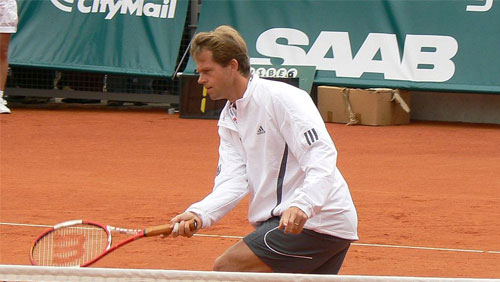We live in a time where tennis greats all hail from Europe. Where once we loved the American icons such as Pete Sampras and Andre Agassi or worshipped the Antipodean artistry of Lleyton Hewitt or Pat Rafter, we now look up to the Holy Trinity.

Rafael Nadal, Novak Djokovic and Roger Federer have changed tennis history and given the game a future where other European players will have to reach the top of their craft to live up to the reputations that preceded them.
Three decades ago, three other European heavyweights redefined the era in which they played. German phenomenon Boris Becker, Swedish serve & volley specialist Stefan Edberg and clay court craftsman Ivan Lendl all commanded huge respect as they carved out careers that stand up to scrutiny today. We start our look at what each man achieved and how he did it by looking at the Swedish superstar who stepped out of the shadow of a tennis icon and made his own name one of legend.
Stefan Edberg won six Grand Slam events in a tennis career that ran from 1983 to 1996 and crossed over with stars such as Bjorn Borg and Pete Sampras. The serve & volley specialist won $20 million in his amazing career, during which time he won the Australian Open twice, Wimbledon twice and U.S. Open twice, only missing out on the French Open, at which he would reach the final just once and lose in dramatic fashion.
Edberg was a prodigious youngster in a way Boris Becker wasn’t. While Becker seemingly came out of nowhere to win Wimbledon at the age of 17 as a wildcard, Stefan Edberg won all four ‘Junior Slams’ by 1983, becoming the first and only player to do so in the Open era.
Tragedy hit Edberg’s fledgling career in 1983 too, as a wayward serve hit linesman Dick Wertheim in the groin, resulting in him falling out of his chair at the U.S. Open, hitting his head. Tragically, Wertheim died in hospital five days later, and his family successfully sued the U.S. Tennis Association for $2.25 million.
Edberg’s breakthrough year may have been delayed, but by 1985, everyone knew him for his tennis talent rather than his tragic serve that went awry. Edberg was part of the winning team at the Davis Cup in 1984 and 1985, before his maiden Grand Slam win at the Australian Open in 1985.
This first Grand Slam was followed by another Australian Open title in 1987, before the career-defining conflict that was his battle to win Wimbledon between the years of 1988 and 1990. It was a rivalry which he shared with Boris Becker. Edberg won the first of their trio of back-to-back finals in SW19 in 1988, in a game that took two days to complete due to spectacular rain delays that forced a fractured final into a tense conclusion.
In 1989, Becker got his revenge, but that wasn’t the only painful loss of 1989. Despite having a game far more suited to the hard courts of the Australian Open and U.S. Open and in particular the grass courts of Wimbledon, Edberg reached the final of the French Open at Roland Garros.
Standing in his way of what would turn out to be his only shot at glory in France was Michael Chang, an unfancied 17-year-old. Two sets to one up, Edberg just had to close it out. He was unable to do so, allowing Chang back into a decisive fourth set, which he would lose 6-4. Chang ran away with the fifth set, winning it 6-2 and clinching a record-breaking win, being the youngest-ever player to win a Grand Slam final. It was billed as the final that Michael Chang ‘refused to lose’, and to this day is a singular event in men’s tennis history.
None of that helped Edberg build his legend, but follow-up victories at Wimbledon in 1990 and at the U.S. Open in 1991 and 1992 cemented his story as one of huge success. Edberg’s notorious ability to serve & volley his way to success was something that he achieved in a crowded field. Becker loved to serve and volley. Sampras entered the arena outdoing everyone in that style. But Edberg carved out a career to be proud of an helped to define the era in which he played.
https://www.youtube.com/watch?v=JKRFz1g5QDQ